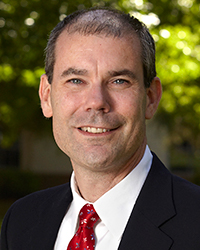Virtually Possible
While leading a concerted effort to move Boyd Law School instruction online, Professor Thom Main discovers some unexpected benefits

By Paul Szydelko
Only a handful of professors at the UNLV William S. Boyd School of Law had taught remotely before the COVID-19 pandemic made virtual classrooms not only more common but imperative.
The harried switch to online during the spring semester convinced faculty members to develop a more systematic approach in the fall. Enter Professor Thom Main, who chaired an eight-member committee that was organized to be a resource for the entire faculty.
The committee met weekly over Zoom and via email throughout the summer, ultimately determining that the best path forward was to limit the number of online platforms used while helping professors make the best choices for their own experience and their students’ needs. Main says it was important for each faculty member to understand technology’s constraints and opportunities, and come to terms with their own limitations and skills to deploy those tools.
“You might be ambitious for the sake of your students and want to take advantage of every conceivable thing out there,” says Main, who has been at Boyd Law School since 2012. “But if you’re not going to master it, you’re not going to be a good teacher.”
Main was inspired by how nimble his fellow professors were at the pandemic’s outset. “It still does give me goose bumps to realize how committed to the enterprise of teaching my colleagues are—‘Oh, teaching online? Never done that before. But sure, I’ll be there Monday morning.’”
What’s even more impressive, he says, is the variety of techniques the faculty has embraced with a more deliberate approach. The virtual environment hasn’t neutralized the divergent personalities and distinct flavors of presentation.
“[Professor] Joe Regalia’s at one extreme,” Main says. “He’s never seen a piece of technology that he can’t put to immediate and great use.” Meanwhile, he says professor John Valery White “has become more Socratic than ever,” creating an intimate virtual venue and asking critical questions of a limited number of students to draw out key ideas and promote understanding.
Main, who has never even delivered a PowerPoint presentation in class, admits he’s among the least technologically sophisticated among his peers (he surmises that’s likely why he was charged with leading the committee). But while he might be a tech novice, he says his long-simmering passion for podcasts has boiled over during the pandemic.
Hesitant to lecture extensively online, Main—who taught two sections of first-year civil procedure during the fall 2020 semester—has refined legal topics into tightly edited audio files. His students can listen when they want, which leaves more classroom time to discuss hypotheticals and real-world applications.
And those students won’t be Main’s only audience: The professor plans to post his podcast episodes, which feature interviews and lectures of varying levels of detail on CivilProcedure.com, a domain name (along with CivilProcedure.org and CivilProcedure.net) he has owned for 25 years.
“A year ago, if you would have suggested to me that I’d be teaching online, I’d probably tear up — worrying about how my students will ever become the successful, ethical professionals that I want them to be if I’m teaching them online. I am now quite comfortable with the idea that some of this—a lot of this—really works.”
Main has no doubt that the transition to educating students online reflects what is happening in law practices and courtrooms. He also has no doubt there will be little turning back.
“This transition to an online environment, however artificial or contrived or forced it might be, is a quick look not at the future of legal practice but contemporary legal practice,” Main says. “There will be some going back. But when it comes to legal practice, there’s no way we’re going back to circa 2019. Even if we eliminate COVID, legal professionals are going to keep applying a lot of the online techniques that have proven to be surprisingly useful.”